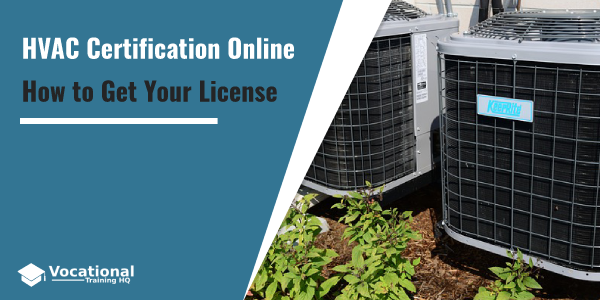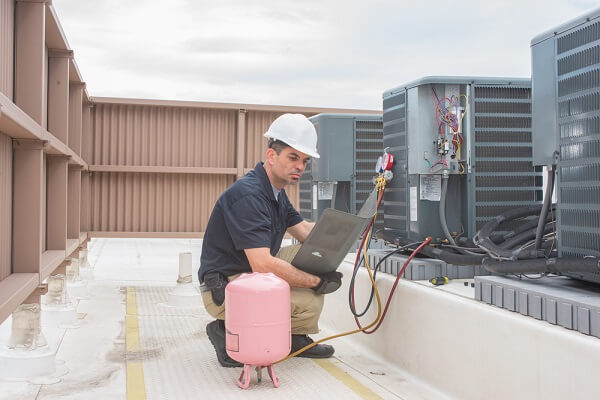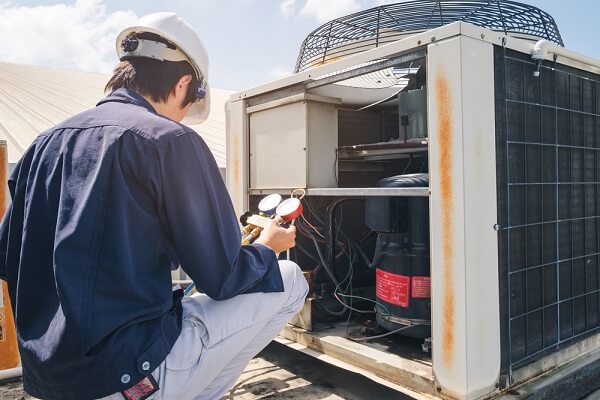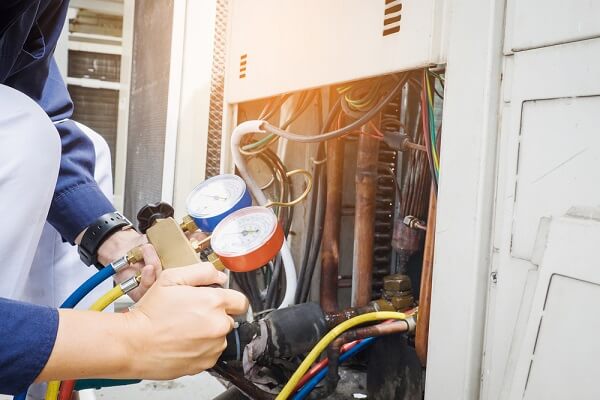If you want to complete your training but feel like you don’t have enough time, night classes or school training may not be an option for you.
However, now you have an opportunity to obtain your education by applying for an HVAC certification online training program.
Sometimes, there is even an opportunity to take your exam online.
In this article, you will learn about online HVAC training programs as well as their pros and cons.
Article Table of Contents
- 1 What You Can’t Do Online
- 2 What You Can Do Online
- 3 Diplomas, Certificates, And Degrees
- 4 Types of HVAC Technician Program Certifications
- 5 Online HVAC Program Duration and Cost
- 6 Courses and Educational Objectives for an Online HVAC Technician Training Program
- 7 Benefits of an Online HVAC Technician Training Program
- 8 Drawbacks of an Online HVAC Technician Training Program
- 9 Benefits and Drawbacks of an Online HVAC Technician Training Program – Summary Table
- 10 State Licensing
- 11 Accreditation and Continuing Education
- 12 Self-Study Tips for Online Students
- 13 Schools Offering Online HVAC Training
- 14 Key Takeaways
- 15 Frequently Asked Questions
- 15.1 Can I Get a Free HVAC Certification Online?
- 15.2 How Much Does Online HVAC Training Cost?
- 15.3 Is Accreditation Important for HVAC Certificates?
- 15.4 Is There Demand for HVAC Techs with Certificates They Earned Online?
- 15.5 How Difficult Is It to Learn HVAC Online?
- 15.6 How Long Does It Take to Get an Online HVAC Certificate?
- 15.7 What Are the Requirements for Enrolling in an Online HVAC Technician Program?
- 15.8 What Are Some Types of HVAC Technician Job Positions?
- 15.9 What Is the General Job Description of an HVAC Technician?
- 15.10 What are HVAC/R Systems?
- 15.11 How Much Money Can I Expect to Earn as an HVAC Technician?
- 15.12 Can Online HVAC Technician Students Receive On-the-job Training?
- 15.13 If I Move out of My Current Area, Can I Expect to Find Work as an HVAC Technician?
- 15.14 Can I Get Additional Training?
What You Can’t Do Online
You need to know that obtaining a license, certification, or degree cannot be obtained completely online.
In most states, you need to enroll in an apprenticeship program in order to get your journeyman or master’s license.
In other words, hands-on experience is an essential part for anyone who wants to get their HVAC license.
You also need to know that you need to provide a notarized resume as well as job experience proof in order to get your license.
The examination process cannot be completed online and you need to attend a proctored test site.
Applying for online training, in some cases, you can get some kind of in-person components so you practice at least some key concepts.
Considering the fact that HVAC specialists are obliged to work with their hands, practice is an important aspect of your training.
Nevertheless, you have an opportunity to complete theory classes from the comfort of your home as a first step to getting your HVAC certification online, but a hands-on experience cannot be studied online.
What You Can Do Online
Despite limitations related to practice, you can complete lots of aspects online when pursuing your HVAC certification or degree.
There are lots of training programs that have the Accrediting Commission of the Distance Education and Training Council (DETC) accreditation.
When it comes to a licensing process, you usually need to complete a certain amount of training as an apprentice, journeyman, and master.
You need to make sure that your program is accredited so check your state’s requirements to make sure you’ll be eligible to get your license after finishing your training program.
You need to know that other not state-approved courses can be very valuable even if they don’t lead to HVAC licensing.
Applying for a training program provided by HVAC schools, you’ll be provided with different tutorials, reference materials, manuals, guides that you need so you can complete your training successfully.
After obtaining all these materials, you can work on them at your own pace.
You need to find a perfect combination of online education, hands-on training, and working experience that will lead to your perfect HVAC career.
Among the available areas, there are:
- Air conditioning technology;
- Automatic and electronic controls systems;
- Commercial refrigeration and heating systems;
- Programmable controls;
- Refrigerants;
- Refrigeration technology;
- System evacuation;
- System charging.
After completing an approved online program, you have an opportunity to get your NATE certification.
Below, you can find more information about the issue.
Speaking of EPA Type I certification, it can be obtained online from start to finish.
You need to know that some HVAC programs contain the EPA certification as a part of their curriculum.
So getting HVAC certification online is not impossible, or at least a part of it.
Diplomas, Certificates, And Degrees
There is a whole variety of online courses, vocational schools, specific institutes, and colleges that offer HVAC training.
It means that you should be very careful when looking for the right training program you can apply for.
Some of these options are available online at least partially.
Just make sure to check all the available options in your area.
Below, you can find information about all the available options that may interest you.
Nine- To Ten-Month Diploma/Certificate Program
Applying for a trade school or community college training, you enroll in an HVAC diploma program that can be completed in 9 or 10 months.
During your education, you’ll be able to get a bunch of basic knowledge required for your future career.
You need to know that you can complete the theory part online but the in-shop part and apprentice hours should be completed online.
Two-year HVAC Associate’s Degree Program
After obtaining an Associate’s Degree in HVAC, you’ll be able not only to get your diploma but also gain an excellent understanding of basic HVAC principles and concepts.
To be able to apply for it, you need to have your high-school diploma or GED.
It is a great opportunity to get some extra points when looking for entry-level jobs.
There is a variety of accredited online programs you can apply for if you want to get an HVAC Associate’s Degree.
After completing it, you can work as an HVAC mechanic, technician, sales consultant, maintenance, air conditioning tech, refrigeration tech, and so on.
HVAC Bachelor’s Degree Program
If you feel like getting some more profound training, the HVAC bachelor’s degree program will be the best option for you.
This four-year program aims to prepare specialists that can work as hands-on technicians as well as perform various managerial roles.
It is a great option for those who are interested in project management and communication issues of HVAC.
After completing this program, you’ll be able to work as a project manager, facility manager, HVAC supervisor, technician, and so on.
HVAC Engineer Program
One other great option is to choose a program that is focused on engineering.
You need to know that there aren’t bachelor’s degree programs that are concentrated on HVAC specifically.
If you are interested in this career and want to get a bachelor’s degree, you should consider applying for a Mechanical Engineering degree.
After completing such a program, you’ll be able to work with thermodynamics, refrigeration systems, and heating technology.
One other point is that this program allows you to work outside of HVAC but it is good enough to prepare you to work with ventilation, heating, and air conditioning systems.
A bachelor’s degree in mechanical engineering allows you to work as a mechanical engineer, field service engineer, design engineer, inspector.
Just keep in mind that your training program should be accredited by your regional agency or HVAC Excellence.
It means that your program meets industry standards.
Types of HVAC Technician Program Certifications
There are three types of HVAC Technician program certifications offered by governing bodies that have established accreditation standards for the industry.
EPA Section 608 Certification
In order to get the EPA Section 608, you need to complete a Type 1 certification test that can be done online.
It is an open-book exam that can be done both in a testing center or online.
Speaking of EPA 608 certification Types 2 & 3, both these options require proctored testing.
After completing Type 1 certification, you’ll be able to work with small appliances (5 lbs or less of refrigerant) that use hazardous refrigerants.
This national examination is required by federal laws and has no expiration date.
The exam includes a core section and a specific exam.
Just keep in mind that you’ll need to complete a core section once again if you decide to take the Type 2 or Type 3 exams in the future.
There are lots of free practice tests for various sections of the exam so you can get ready for the Type 1 exam.
After making sure you are ready for the final test, you need to register at EPATest.com.
Speaking of Type 2 and 3 exams, they are related to high and low-pressure appliances, respectively.
Both these types require you to complete an exam in a proctored environment.
Nevertheless, Zack Academy provides an opportunity to pass these exams online with the help of a webcam.
If you want, you can learn about their programs using their official website.
NATE And HVAC Excellence Certification
HVAC Excellence Certifications are provided by a nationally recognized organization that developed a program that is considered a benchmark for excellence within the field.
After completing some required exams, applicants get an employment-ready certification.
During these exams, you need to show your excellent knowledge of the sphere you are going to work in.
Tests are held at the end of each course module during your training.
Speaking of a NATE (North American Technician Excellence) certification, it shows your knowledge of HVACR systems.
It covers a whole variety of topics that are related to different spheres of HVAC.
This certificate is considered valid proof of your knowledge to your employers and consumers.
Among the NATE specialty areas, there are:
- Heat pumps;
- Gas heating;
- Oil heating;
- Hydronics gas (service only);
- Hydronics oil (service only);
- Light commercial refrigeration (service only);
- Commercial Refrigeration (service only);
- Ground Source Heat Pump Loop Installer;
- Senior HVAC Efficiency Analyst.
Both these options aim to evaluate your practical knowledge of the HVAC field.
While state exams are mainly focused on technical issues, HVAC Excellence and NATE pay more attention to various daily situations you may face working as an HVAC tech.
If you are interested in one of those exams and want to get ready for them, you can use numerous online resources.
Online HVAC Program Duration and Cost
Most online certification programs for entry-level HVAC Technicians can be completed in as little as six months.
Those who want more advanced education can enroll in an online associates program that can be completed in 1.5 to 2 years.
An online bachelor’s degree would take about four years to complete.
Costs vary depending on the school and your payment plan; however, online programs are generally less expensive than campus programs.
Since you are not paying for campus overhead and room and board with an online program, you will be saving money.
Their costs are usually in the 10,000s, while you should expect to pay between $700 and $800 for an online program.
Anticipate paying an extra $100 or more if you pay over time.
Courses and Educational Objectives for an Online HVAC Technician Training Program
The HVAC Technician certificate program will provide the knowledge and training needed to install, repair, and maintain residential and commercial air conditioning, heating, and refrigeration systems.
Major courses that are offered are:
- Heating and Air Conditioning Orientation
- Fundamentals of HVAC/R Safety, Systems, and Controls
- HVAC/R System Design, Layout, and Commercial Applications and Installation
- Electrical Systems
With this and other coursework, you will gain an understanding and full mastery of scientific principles of heating and cooling, HVAC/R system components and functions, and the ability to handle the equipment with precision and safety.
Here are some of the specific learning objectives:
- Know techniques to identify faulty functions in heating and cooling systems
- Trouble-shoot by identifying repair procedures used for residential and commercial heating systems
- Learn the basics of a cooling system such as compression, condensation, and evaporation as they apply to pipping
- Identify standard refrigerants used in commercial applications and know safe handling and disposal procedures
- Explain how oil, gas, boiler, and hydronic heat pumps work
- Connect systems to electrical sources
- Understand and apply government regulations and guidelines for installing, maintaining, and repairing heating, cooling, and refrigeration systems
Benefits of an Online HVAC Technician Training Program
Many choose to enroll in campus programs because they like the structure and personal contact with professors and students.
But if you work full-time and are unable to travel, you will need an option that conforms with your busy schedule, allows you to learn at your own pace, and frees you from the hassle of commuting.
If you need both flexibility and convenience yet want the same quality of education, an online HVAC Technician Training Program is your best option.
Although studying online is not without its caveats, the advantages are significant.
Here are some of the pros and cons of enrolling in an online program for HVAC Technician training.
No Deadlines for Program Completion
Go at your own pace so that you can study around your busy work schedule without any pressure.
Convenience
No traveling, sitting in traffic, or difficulty parking. You can take the HVAC training program 100% online. An online program is ideal if you cannot or do not want to commute to campus.
Many Programs to Choose
There are over 130 accredited online programs to compare and select from.
Affordable Costs and Payment Options
Tuition fees vary depending on your payment plan and the program. Still, they are more affordable for an online program because fewer cost factors are involved. Remittance is flexible. You can opt to make a lump-sum payment or arrange a payment plan.
Media-rich Learning
Educational content is diversified with streamed presentations, animations, simulations, videos, and digital textbooks are provided.
Mobile-friendly Platforms
Online resources and a student portal help center are accessible on all electronic devices.
Certification Preparatory Manual
Materials and practice tests are provided to prepare you to sit for exams. In addition, some online programs offer a voucher to cover or offset certification exam costs.
Drawbacks of an Online HVAC Technician Training Program
Lack of Student and Instructor Engagement
Connection with your instructor and other students is difficult when you are studying online.
Although you don’t have an in-person experience, communication is not impossible.
You can find other methods to hook up.
Time Management is a Challenge
Students can find it difficult to manage their time wisely when completing online coursework.
Without a schedule, it’s easy to get distracted by other life demands that could cause you to fall behind in coursework and cramming to compensate for lost time.
Lacking Practice
It’s a bit harder to learn working with your hands, without working with your hands.
You’ll get all the practice on the job, but if it’s a deal-breaker for some not having a good way to practice.
Physical Testing
Most likely, you’ll be required to take the certification exam at an approved testing site.
Benefits and Drawbacks of an Online HVAC Technician Training Program – Summary Table
| Benefits of an Online HVAC Technician Training Program | Drawbacks of an Online HVAC Technician Training Program |
|---|---|
| No Deadlines for Program Completion | Lack of Student and Instructor Engagement |
| Convenience | Time Management is a Challenge |
| Many Programs to Choose | Lacking Practice |
| Affordable Costs and Payment Options | Physical Testing |
| Media-rich Learning | |
| Mobile-friendly Platforms | |
| Certification Preparatory Manual |
State Licensing
We’ve told you about various certification options but you need to know that all of them don’t meet legal requirements in specific areas.
In other words, each state and even county or city has its own licensing requirements.
To be able to get your license, you need to pass a test specifically for your area.
Also, there are some fieldwork requirements that can be partially fulfilled by some online or classroom programs.
To learn more about the requirements and testing in your area, make sure to get in touch with an appropriate government office.
Accreditation and Continuing Education
It is advisable to choose a program that is accredited through one of the major HVAC governing bodies mentioned, such as NATE, or through others such as the Air Conditioning Refrigeration Institute (ACRI) or the Partnership for Air Conditioning, Heating, and Refrigeration Accreditation (PAHRA).
You want to ascertain that you receive a quality education that conforms to established accreditation standards.
In addition, some employers may prefer candidates who have completed accredited training.
Completing an online accredited HVAC Technician Program can give you an edge in the job market.
Once you are credentialed and established in the field, you will be required to maintain your existing licensure.
As regulations and technology advance in the industry, so must your competency.
All working HVAC Technicians must obtain 14 continuing education credits every two years to keep their certification current and valid.
Self-Study Tips for Online Students
Your success in completing an online HVAC Technician training program will depend on your level of self-motivation.
You don’t have a traditional classroom structure, so you must hold yourself accountable.
The following tips will guide you to stay on track with your online studies:
Time Management
Follow the timeline of your syllabus by keeping a calendar of deadlines.
Divide time between segments.
Study Location
Choose an area that is private, quiet, and has a solid internet connection.
Stick to that area to train your mindset for studying in one location.
Problem Solving
Get immediate assistance to help solve a problem with coursework, so you don’t get behind.
Exam Preparation
Prepare for the HVAC exam by taking practice tests that will be provided for you.
Get tutored by someone who has taken the exam, has done well, and knows what to expect.
Hands-on Experience
The most effective way to learn the course material is to apply it in a practical setting.
Find apprenticeship or internship opportunities that will help you master the HVAC concepts.
Schools Offering Online HVAC Training
| School Name | Address |
|---|---|
| Ashworth College | 5051 Peachtree Corners Circle, Suite 200 Norcross, Georgia 30092 |
| Penn Foster | 14300 N Northsight Blvd., Suite 125 Scottsdale, AZ 85260 |
| Air Conditioning Contractors of America Association, Inc. | 1330 Braddock Place, Suite 350 Alexandria, VA 22314 |
| Excelsior College | 7 Columbia Circle Albany, NY 12203-5159 |
| Midlands Technical College | 1674 U.S. 321 Business, Winnsboro, SC 29180 |
| The University of California, Berkeley | 1995 University Ave., Suite 200 Berkeley, CA 94704-7000 |
| Charter College | 750 Sandhill Rd, Suite 100 Reno, Nevada 89521 |
| California State University, Chico | 400 W First Street | Chico, CA 95929-0250 |
| College of Staten Island | 2800 Victory Blvd Staten Island, NY 10314 |
| San Diego State University | 5250 Campanile Drive San Diego, CA 92182-1920 |
| UCLA | 10960 Wilshire Blvd., Suite 1600 & 1700 Los Angeles, CA 90024 |
| UTSA | 501 W. Cesar Chavez Blvd., San Antonio, TX 78207 |
| Wake Tech | 9101 Fayetteville Road Raleigh, NC 27603 |
| USCI | 2001 Lowe Street, Fort Collins, CO 80525 |
| Interplay Learning | 3500 Jefferson St. Suite 206 Austin, TX 78731 |
| Tyler Junior College | 1327 South Baxter Avenue Tyler, Texas 75701 |
Key Takeaways
Your success with completing an online HVAC Training Program will depend on your interest and dedication to learning and perfecting the many needed skills to do this job.
Though once you have mastered the basic principles of the course work and proven your competency through the certification process, the real test of success will be your experience in the field.
If you consider enrolling in an online HVAC Technician Training program, you’ll want to ask yourself these questions.
Do you have what it takes to handle the physically demanding workload and long hours required of an HVAC Technician?
Can you dedicate yourself to precision and safety to benefit the environment and others?
Check out our article about the pros and cons of being an HVAC technician to learn more.
Whether you are a hands-on person already or have a passion for performing the varied duties and facing any challenges of the HVAC industry, enrolling in an online HVAC Technician Training program could be the right career move.
The convenience, flexibility, and affordability of an online HVAC Training Program can provide you with an opportunity that may not have been there for you otherwise.
This online program is an especially good move if you are interested in improving the environment and want to learn a new skill set on a timeline that works with your schedule.
Frequently Asked Questions
Can I Get a Free HVAC Certification Online?
As far as we know there are no options that allow you to get your HVAC certification online for free.
In most cases, you are obliged to take your examination in a proctored environment.
Those programs that offer online training, do have a cost.
How Much Does Online HVAC Training Cost?
HVAC certificate programs vary in price depending on the school, you can find programs from $1,500 to $15,000.
If you are looking to get an associate degree, it will probably range between $15,000-$35,000.
Is Accreditation Important for HVAC Certificates?
Yes!
It’s important to check the school you are about to go to is accredited.
It’s more than this certificate you are about to get, it’s about future progress, if your certificate is not from an accredited school, it might not be accepted by other institutions when you’ll be going after a more advanced HVAC-related certificate in the future.
Is There Demand for HVAC Techs with Certificates They Earned Online?
There is a lot of demand for HVAC techs, period.
Where you got your education from might affect a potential employer’s choice whether to hire you or not, it’s best to get your training from a well-known and respectful institution, however, after you gain some experience, most employers will care more about your experience and how dedicated you are to your work.
The HVAC industry is expected to grow 4% over the next ten years, adding over 15,000 new positions.
As per the Air Conditioning Contractors of America (ACCA), the industry’s value is anticipated to increase by $10 billion by 2030.
How Difficult Is It to Learn HVAC Online?
HVAC training isn’t difficult for people with good mechanical skills.
However, studying online, in theory, makes it a bit harder.
Rest assured you will get a lot of hands-on experience once you start working or get an apprenticeship.
How Long Does It Take to Get an Online HVAC Certificate?
It can take as little as 6 months, and as long as 1 year.
It depends on the program you are enrolling in, and in most cases – your pace.
Many online programs let you study at your own pace, so it’s really all up to you with these kinds of programs.
What Are the Requirements for Enrolling in an Online HVAC Technician Program?
You must have either a high school diploma or a GED.
What Are Some Types of HVAC Technician Job Positions?
Positions as an HVAC tech include:
- HVAC Technician
- Installer
- Refrigeration Mechanic
- Refrigeration Transporter
- Refrigeration Technician
What Is the General Job Description of an HVAC Technician?
An HVAC Technician installs, cleans, maintains, inspects, tests, and repairs heating, ventilation, cooling, and refrigeration systems.
The technician can work with residential or industrial systems as per the employer.
What are HVAC/R Systems?
They are systems that control the temperature and air quality in residential and commercial buildings.
How Much Money Can I Expect to Earn as an HVAC Technician?
Salaries vary by state, employer, and experience.
The average salary range is approximately between $48,000 and $51,000, or around $23.00 per hour.
Pay raises are customary as you attain more skills on the job.
According to the Bureau of Labor Statistics, the average pay in 2020 was $53,410, and the top 10% made $78,910 or more.
Can Online HVAC Technician Students Receive On-the-job Training?
There is extensive on-the-job training once you complete the initial certification program.
Multiple opportunities exist to work as an apprentice or in an externship under experienced workers.
If I Move out of My Current Area, Can I Expect to Find Work as an HVAC Technician?
You can work almost anywhere since HVAC systems are necessary to live and work in a temperature-controlled environment.
Can I Get Additional Training?
If you want additional training, you can enroll in an HVAC/R Technician Program, but you must have one or two years of industry experience.
Read the full guide: How to Become an HVAC Technician







It’s great to see more options for obtaining HVAC certification online. With busy schedules, flexibility is key!
I’ve been considering a career change and this post is exactly what I needed! Online HVAC certification seems like a practical way to advance without disrupting my current job.
As someone who’s passionate about sustainability, I’m thrilled to see online options for HVAC certification. It’s a step towards more eco-friendly practices in the industry.
I just discovered that there are no deadlines for the completion of the HVAC training which is good for many of us that are busy. Online training is a huge help for me because I like to manage my time.
There are lots of schools to choose from! I have selected my top 3 schools for the HVAC training and I’m going to inquire about them as soon as possible and compare. Good thing there is an online certification program!
I have a few certifications and I want to gain more for my business. Online certification is a must since I am working too, and I want to study or attend training at my own pace. Thanks for this!
I’m going to consider getting an EPA Section 608 Certification first before anything else and maybe get more certifications once I am ready to gain more skills. Anyway, getting an online certification for HVAC is less hassle!
I went through training online, I didn’t think it will be possible to really understand everything online but I was wrong and I’m glad I was.
Everything went smoothly for me with the online course, it was hard on my part to stick with it, but now that it’s done I am so happy I did it.
If there’s any advice I can offer you it’s find an on-the-job training gig while taking online classes, you might not get paid or get paid a little, but working while learning online has you covered with both practice but also work experience at the same time, after all, the goal is to get a job in this field.
I have a Degree in HVACR 2014 graduate i just need the license required to work independently (sub-Contractor) in Texas (renew)